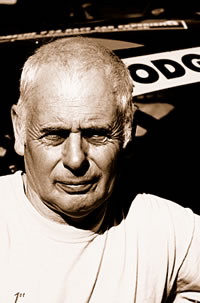 |
| .:::::::::::::::::::::::::::. |
| : Home |
| : Aims of the PDA |
| : PDA Officials |
| : Latest News |
| : Results |
| : Technical Regulations |
| : Where to find us |
| : For Sale |
| : MotorSports Links |
| : Forum |
| : Drivers |
| : Circuits |
| : Start Racing |
| : Photographs |
| : Contact us |
| .:::::::::::::::::::::::::::. |
Profile : Ernie Cheetham - Chariman PDA
At the age of 19 moving on to form Competition Motors with his brother Ron, who was already taking part in rallies with an Austin Healy Sprite which he helped to maintain. In 1962 they decided to manufacturer own car, calling it the Cheeta GT. They designed and built own body shell, made out of glass fibre. Using all mini components they built a race car to promote sales of road car. The car cost £3,000 to build and two thousand engine. It was 1275 mini coope S engine bored out to 1293 the engine was giving out 110 brake horse at wheels. Joined BRSCC in early 60’s also Aintree Circuit Club. Enter it into the Special at class up to 1300cc. The car in those days was very competitive and enjoyed much success at Aintree and Oulton Park. Unfortunately the BRSCC upped the class to 1600cc so the car was no longer competitive. They sold the car. In 1979 Lodge Garage Manchester came on the market for sale and Ernie purchased it and ran the business from there. Steven was 5 year’s of age at the time. Then decided to take a back seat from competitive sport, concentrating on the business. As time went on and Steven, at a very young age became interested in Porsche cars eventually getting involved in Lodge Garage selling secondhand and some new parts for Porsche. As we were repairing Porsche cars it seemed to make sense to get involved in 924 Championship. This was in 1996. Sharing the car with Steven, we soon realised nothing had changed in motor racing with the regulations being so tight to the engines we looked elsewhere to make the car competitive. We realised that we had to get the car in and out of the corners more competitively. We put all our efforts into improving the handling side. By 1999 we had the car competitive and a driver called Martin Wood came and joined us. Ernie then took a back seat in the driving side and looked after the cars. Martin had raced in formula ford formula Renault and Formula 600. He had some success in our car in that year. In the 2000 season had 7 wins 2 seconds and a third place and broke many lap records and pole position and was leading the Championship by 14 points going into last round at Brands Hatch. Unfortunately having a puncture in 2nd place and did not finish due to a very unfair point system Martin finished 4th in Championship. In 2001 Keith Penman joined us and won the Championship. 2002 Steven did some races but due to my illness decided to take a back seat in racing, doing nothing in 2003. 2004 we were then approached by ex-Chairman of PDA, Chris Millard and some members to take on title sponsorship and became Chairman. Steve has done some races. Mallory Park, Cadwell and Brands. Concentraing again on Steven’s car being the handling. After all this is what motor racing is all about, to get the car in and out of the corners quicker than your competitor. We have gone to a lot of trouble to gather data from circuits we race, on setting the car up to suit each circuit e.g. tracking camber and adjusting tork from engine sometimes trading straight line speed at some circuits. This is why straight line speed is not always an advantage. |
